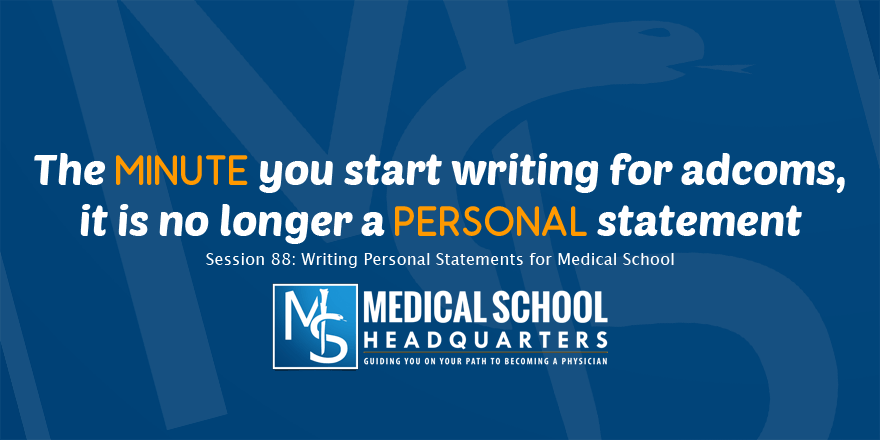Get 20% off a Single 1-on-1 Expert Advising Session Use it for ANYTHING! Learn More!

In today’s episode, I talk with Dr. Greg Polites. For his third time on the show, Greg talks about the dos and don’ts of writing personal statements and why students make mistakes on personal statements.
Dr. Polites is an Associate Professor of Emergency Medicine at Washington University School of Medicine. He serves as Chairman of the Central Subcommittee for Admissions to the School of Medicine and is the former coursemaster for the Practice of Medicine for the 1st and 3rd-year medical students there.
If you’re struggling with your personal statement and need some help and motivation, brace yourself for the wealth of information that you will learn from today’s show. The personal statement in and of itself is not the determining factor for getting into medical school, but it’s still an important piece of the application to allow the admissions committee to understand you better, so take your time to do it right.
[Related episode: What Should Nontrads Focus on in Their Personal Statement?]
Write about your experiences and what they meant to you. Don’t just list off what you’ve achieved. Show, don’t tell.
[Related episode: 5 Biggest Medical School Personal Statement Mistakes]
Yes, if it ties in well. Be sure to cite it.
Yes, because there aren’t a lot of other places in the primary application to put that, and the secondary application may not be a great place for it. That said, don’t spend too much space on them.

Lorem ipsum dolor sit amet, consectetur adipiscing elit
I just received my admission to XXXXX! This is unreal and almost feels like I am dreaming. I want to thank you for all of your help with my application. I cannot overstate how influential your guidance and insight have been with this result and I am eternally grateful for your support!
IM SO HAPPY!!!! THANK YOU SO MUCH FOR ALL YOUR HELP, IM INDEBTED TO YOU! Truly, thank you so much for all your help. Thank you doesnt do enough.
I want to take a few moments and thank you for all of your very instructive, kind and consistent feedback and support through my applications and it is your wishes, feedback, and most importantly your blessings that have landed me the acceptance!
I got into XXXXX this morning!!!! It still has not hit me that I will be a doctor now!! Thank you for all your help, your words and motivation have brought me to this point.
I wanted to once again express my heartfelt gratitude for your help in providing feedback during my secondary applications. Your guidance has been instrumental in my journey.
Just wanted to share my wonderful news! I received my first medical school acceptance! Thank you for all that you do for us Application Academy!!!
I am excited to tell you that I just got my third interview invite from XXXXX today! I can’t believe it. I didn’t even know if I was good enough to get one, let alone three – by mid-September. Thank you so much for all of your help and support up to this point; I would not be in this position without it!!
I wanted to thank you for helping me prepare for my XXXXX interview. Even in a 30-minute advising session, I learned so much from you. Thank you for believing in me, and here’s to another potential success story from one of your advisees!
I just received an acceptance with XXXXX! This is so exciting and such a huge relief and so nice to have one of our top choice schools! I also received an interview with XXXXX which brings the total up to 20 interviews! Thank so much, none of this would have been possible without you!

Join our newsletter to stay up to date
* By subscribing you agree to with our Privacy Policy and provide consent to receive updates from our company.
Resources
Advising Services
Podcasts & Youtube
Books
About
"*" indicates required fields